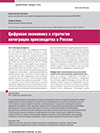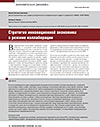Digital Economy in the Strategy of Production Integration in Russia
DOI: 10.33917/es-4.162.2019.18-24
The article formulates conceptual provisions revealing the strategy of production integration in the context of the Russian economy digitalization; the paper justifies the logic of its formation as a socio-economic vector, contributing to creation of the digital economy, ensuring the growth of competitive advantages of Russian enterprises and the economy as a whole; the author reviews foreign experience of the strategy of production integration and integrated structures formation, which should be taken into account in domestic practice; the article analyzes functional strategies of production integration in the Russian economy; the paper substantiates the role of cluster integration, contributing to creation of innovative territorial clusters as a growth factor for the digital economy, which contributes to creating and applying digital technologies, as well as to formation of a new digital platform in the production integration strategy with the aim of improving social and economic situation in the Russian Federation





